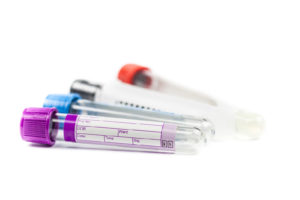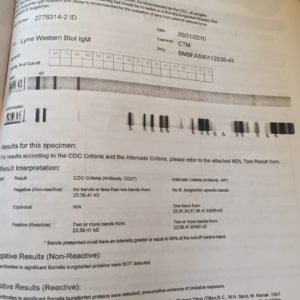 Lyme disease may be one of the most overlooked and misdiagnosed diseases of our time. There are so many reasons for this it may make your head swim.
Lyme disease may be one of the most overlooked and misdiagnosed diseases of our time. There are so many reasons for this it may make your head swim.
To begin with, the bacteria that causes Lyme disease produce such a multitude of symptoms which mimic a very long list of other diseases & disorders. Check out this symptoms list. This can cause your doctor to run the rabbit trail and you the patient running from doctor to doctor.
If you think you may have Lyme, and especially if you have late-stage Lyme, the costs for testing & treating it can be so exorbitant it typically throws one into a state of denial or an immense amount of debt. To make matters even more complicated, standard testing and diagnostics are completely unreliable.
While these issues are a huge part of the problem, I believe the bigger reason this disease remains so obscure is because there are two greatly opposing opinions regarding Lyme disease in the medical world which is hindering further research and development toward better understanding.
Two Sides of Lyme
When you begin to research Lyme disease you will find conflicting information.
One standard protocol is from the IDSA (Infectious Diseases Society of America) and the 2nd from ILADS (International Lyme and Associated Diseases Society).
IDSA and ILADS guidelines both stress that tick-borne diseases need to be determined through clinical judgment however, the CDC puts even greater restrictions on what that means.
The IDSA does not support the fact that Lyme can become a chronic disease so doctors are not trained to look for or even suspect Lyme or the many co-infections involved in tick-borne infections.
Many will completely dismiss their patients’ concerns even when that patient requests the doctor explore further.
Some doctors are willing to write a prescription for an acute infection but they are not giving high enough doses or for the length of time needed to completely cure the disease while it’s in the early stages.

Two Tier Testing
The IDSA restricts the diagnosis of Lyme based on the CDC’s criteria requiring two-tier testing using the ELISA and Western Blot blood tests.
The CDC’s website states: “This surveillance case definition was developed for national reporting of Lyme disease; it is not intended to be used in clinical diagnosis.”
Despite this, they will not recognize a Lyme infection unless it has passed the two-tier testing. Scientific literature proves that this testing is highly unreliable.
The ELISA Test
The first test that is usually given is the ELISA (Enzyme-Linked Immunosorbent Assay) which was originally designed for HIV detection. Later it was used as a surveillance tool for Lyme disease but was not intended to be used as a diagnostic tool.
The Western Blot
The ELISA & Western Blot tests for antibodies rather than the organisms themselves.
The Western Blot tests for two sets of antibodies; the IgM which tests for early antibodies and are produced within the first 4 weeks of an exposure to a disease, and the IgG which tests for antibodies that refer to a later response to the infection.
The CDC Western Blot IgG antibodies are 18, 23, 28, 30, 39, 41, 45, 58, 66, 93 kDa. They require 5 of these bands be positive out of the 10 tested. However, these tests do not identify some of the Lyme specific IgG antibodies. Lyme specific antibodies are 23, 31, 34, 39, 83-93 kDa. Notice bands 31, 34, and 83-92 are missed.
The IgM Western Blot tests for bands 23 kDa, 39 kDa, 41 kDa and two out of the three are required for a positive IgM test.
Testing acute (or early) Lyme is unreliable because the body doesn’t make enough detectable antibodies until after 4 weeks. By this time, without treatment, you have most assuredly become chronic.
Keep in mind that many people don’t get early symptoms from their tick bite. Symptoms can slowly appear over the course of weeks, months or even years. Many people don’t even see a tick so any symptoms they do get they may not recognize as being caused by Lyme.
Testing chronic or late-stage Lyme also poses problems in that antibodies tend to decline over time. The body’s immunities are also compromised by the disease and therefore antibodies are not always present, resulting in a false negative test.
“Both the ELISA and Western Blot tests can only detect whether a person has been exposed to Borrelia and cannot detect an active infection. Antibodies can be produced for months or years after an infection has cleared.”─ Dr. Daniel Cameron
ILADS Physicians
Thankfully, ILADS physicians do not rely on testing alone, however, if you have a positive test they will most definitely accept it.
 During your evaluation with an ILADS physician, you will be given a medical history questionnaire which will probe issues concerning your health, symptoms, and lifestyle as well as potential exposure to the ticks that transmit the disease.
During your evaluation with an ILADS physician, you will be given a medical history questionnaire which will probe issues concerning your health, symptoms, and lifestyle as well as potential exposure to the ticks that transmit the disease.
Recent Lyme studies are showing that Lyme can be spread through vectors other than the deer tick.
This questionnaire is specific to the many symptoms of Lyme disease as well as co-infections.
ILADS physicians will review any labs you have had done. They will most likely order tests through a specialized lab if you have symptoms without a positive Western Blot.
These physicians recognize that if a patient tests positive to any one of the Lyme specific bands on their antibody test, they are indeed positive especially if they have a history of tick bite or a lifestyle conducive to contracting the disease.
Keep in mind that only about 40% percent of infected patients ever recall having been bitten by a tick.
Labs
 While it is possible to get a positive antibody test through a regular lab there are specialty labs where testing is more sensitive and therefore more accurate. IGeneX, Stony Brook, and MDL are three.
While it is possible to get a positive antibody test through a regular lab there are specialty labs where testing is more sensitive and therefore more accurate. IGeneX, Stony Brook, and MDL are three.
There are at least 5 subspecies of Borrelia burgdorferi, over 100 different strains of Borrelia in the United States and 300 around the world. Most standard labs are only testing for one.
Specialty labs also offer different types of testing such as urine and PCR as well as testing for co-infections. Many offer tick testing, which can be more accurate.
My family and I have been tested through standard labs as well as specialty labs.
We were also recently tested by our newest doctor using Auricular Testing methods and are now using homeopathic remedies to regain our health after years of antibiotics and antimalarials.

While antibiotics are very effective with an acute infection if given at high enough doses and for a long enough duration, it isn’t always wise to choose antibiotic therapy for a chronic infection.
Treatment can take years and cause side effects as well as other health issues so each person must decide for themselves along with the advice of an experienced physician.
Antibiotics and antimalarials have most certainly helped me regain much of my health from Lyme and co-infections but at the same time, they compromised other aspects of my health.
I also found that every time I weaned off my medications I would relapse, making me dependent upon them.
What To Do
Finding a knowledgeable physician is the wisest first step. Most of the time word of mouth is the best way. You can also check for Lyme Literate doctors through the links on my front page.
Borrelia, the bacteria that causes Lyme disease, is rarely the only disease you will contract when you’re bitten by a tick. There are many co-infections to consider. It’s also possible to get a co-infection and not Lyme.
It’s necessary to take into consideration what existing health issues you may have. These things can make healing impossible without proper treatment.
Lyme infections cause inflammation and can set off an auto-immune response, cause many other problems. Lyme can attack virtually any system in your body. Your health can become even more compromised the longer you carry the infection.
Dr. Richard I. Horowitz, an ILADS MD has put together a questionnaire that could help you determine whether or not you should pursue Lyme testing. You can find that here Horowitz Lyme-MSIDS Questionnaire
For more information about labs see below:
IGeneX 800-832-3200
To explore a more natural approach to testing and healing please see the link for the doctor we have found to be so helpful. Alternative Medicine Center
I hope this is informative and helpful. By educating yourself you will be able to get a proper diagnosis and treatment if you suspect that you or a loved one has Lyme disease.
Helpful Links:
Just How Reliable Are Lyme Disease Lab Tests, Dr. Bill Rawls
Lyme Testing Global Lyme Alliance





appreciate your research. Have chronic Epistein Barr Virus. Had many tick bites in past.
Hi Tricia! I hope it’s okay that I linked this page to my own blog. I have Lyme, as well as an immune deficiency and autoimmune liver disease. I am doing a series on Lyme for Lyme awareness month. Love your blog – so glad I found it!
Thank you for reaching out Judy and for linking my page to your blog. The more we can get the word out and spread hope to those who are suffering from Lyme the better. <3 Tricia